Just When You Think It Cannot Get Worse
42 minutes ago
popular culture - as if the rest mattered.
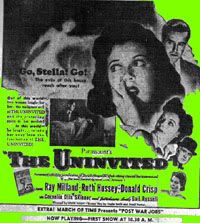 The first really scary film I remember watching with my Mum on TV was Lewis Allen's 1944 The Uninvited, starring Ray Milland and Ruth Hussey. It reproduced the feeling of the hairs on the back of your head standing up when you're convinced somebody - something? - is following you, even though you've looked behind you repeatedly and seen nothing there, only strengthening the feeling that something is hiding.
The first really scary film I remember watching with my Mum on TV was Lewis Allen's 1944 The Uninvited, starring Ray Milland and Ruth Hussey. It reproduced the feeling of the hairs on the back of your head standing up when you're convinced somebody - something? - is following you, even though you've looked behind you repeatedly and seen nothing there, only strengthening the feeling that something is hiding. Eventually I stopped watching horror films, because the genre came to the point where "horror" was no longer interpreted as rising tension leading to a macabre catharsis (as in Brian de Palma's 1976 interpretation of Stephen King's Carrie), but rather what Takashi Shimizu, director of The Grudge and The Grudge II, called a "splatter-boom". I can sympathise with him - from Romero's Night of the Living Dead through The Evil Dead to Thirteen Ghosts (I refuse to write THIR13EN unless imprisoned in parentheses), cinema-goers have been robbed of horror by self-aggrandising directors and tantrum-prone stars.
Eventually I stopped watching horror films, because the genre came to the point where "horror" was no longer interpreted as rising tension leading to a macabre catharsis (as in Brian de Palma's 1976 interpretation of Stephen King's Carrie), but rather what Takashi Shimizu, director of The Grudge and The Grudge II, called a "splatter-boom". I can sympathise with him - from Romero's Night of the Living Dead through The Evil Dead to Thirteen Ghosts (I refuse to write THIR13EN unless imprisoned in parentheses), cinema-goers have been robbed of horror by self-aggrandising directors and tantrum-prone stars. Which is where Takashi Shimizu comes into his own. His story starts with a three-minute horror film starring Takako Fuji as a "ghost"; this developed into a Japanese film series called Juon, the first of which - uniquely - was remade in Japan using the same crew, much of the original script and some of the original actors starring with American players, as The Grudge.
Which is where Takashi Shimizu comes into his own. His story starts with a three-minute horror film starring Takako Fuji as a "ghost"; this developed into a Japanese film series called Juon, the first of which - uniquely - was remade in Japan using the same crew, much of the original script and some of the original actors starring with American players, as The Grudge. Shimizu eschews special effects, except where he cannot but employ them. For example, in The Grudge there's a scene where a detective is watching a corridor on CCTV; progresively, lights fail as a spectral figure advances until the screeen goes dark, and suddenly a pair of eyes appears on the screen. To achieve the effect, Shimizu had painted Fuji's face black, so that when she opens her eyes to reveal her trademark huge globes, you are scared because you know this is no SFX: you're looking at the real thing. Similarly, when she hobbles hands-first down a flight of stairs as if her joints are set at obscene angles, it's really her moving - she's a woman of many talents. Most of The Grudge and The Grudge 2 could have been made by the team behind The Uninvited.
Shimizu eschews special effects, except where he cannot but employ them. For example, in The Grudge there's a scene where a detective is watching a corridor on CCTV; progresively, lights fail as a spectral figure advances until the screeen goes dark, and suddenly a pair of eyes appears on the screen. To achieve the effect, Shimizu had painted Fuji's face black, so that when she opens her eyes to reveal her trademark huge globes, you are scared because you know this is no SFX: you're looking at the real thing. Similarly, when she hobbles hands-first down a flight of stairs as if her joints are set at obscene angles, it's really her moving - she's a woman of many talents. Most of The Grudge and The Grudge 2 could have been made by the team behind The Uninvited. The Grudge, like The Grudge 2, terrifies because it is more cerebral than visceral. There are references to an old Japanese myth where a king plays chess with a servant, who beats him: he has the servant, his wife, their son and his cat killed. The latter two combine into a demon and travel over the land. Although it's a Japanese tale, Shimizu hits home worldwide because he knows how to film the international iconography of irrational fear.
The Grudge, like The Grudge 2, terrifies because it is more cerebral than visceral. There are references to an old Japanese myth where a king plays chess with a servant, who beats him: he has the servant, his wife, their son and his cat killed. The latter two combine into a demon and travel over the land. Although it's a Japanese tale, Shimizu hits home worldwide because he knows how to film the international iconography of irrational fear. It's not fair, and in a sense that's the point. Classic horror stories and classic detective stories have something in common in that they're about breaking a natural law and the subsequent retribution, be that at the hands of Scotland Yard's finest or the ethereal forces patrolling fictional firmaments - so that there's a similarity in that sense between The Day the Earth Stood Still and The Hound of the Baskervilles, while the tale of Jack the Ripper, who was unfortunately all too real, slips between them into a disturbing space that is too crowded today. I'm reminded of Tom Clancy's remark about the difference between fact and fiction - "Fiction has to make sense". Draw your own conclusions.
It's not fair, and in a sense that's the point. Classic horror stories and classic detective stories have something in common in that they're about breaking a natural law and the subsequent retribution, be that at the hands of Scotland Yard's finest or the ethereal forces patrolling fictional firmaments - so that there's a similarity in that sense between The Day the Earth Stood Still and The Hound of the Baskervilles, while the tale of Jack the Ripper, who was unfortunately all too real, slips between them into a disturbing space that is too crowded today. I'm reminded of Tom Clancy's remark about the difference between fact and fiction - "Fiction has to make sense". Draw your own conclusions. spaces where narrative can be expanded. It's a staccatto stream of disturbing images that leaves you too scared to scream in case you miss something that might calm you down. And yet...out of both films I can only recall one scene where blood flows. Like other Japanese horror - which is becoming so well-known in the West that it's called J-horror - it is fuelled by the fears of the beholder. Was that a flash of light on the window, or a face? Are strangers looking out at me from photographs? What is it that I'm running from when I belt out of my front door?
spaces where narrative can be expanded. It's a staccatto stream of disturbing images that leaves you too scared to scream in case you miss something that might calm you down. And yet...out of both films I can only recall one scene where blood flows. Like other Japanese horror - which is becoming so well-known in the West that it's called J-horror - it is fuelled by the fears of the beholder. Was that a flash of light on the window, or a face? Are strangers looking out at me from photographs? What is it that I'm running from when I belt out of my front door? There's a charity in North-East England called Thomas, which stands for those on the margins of a society, that works "at the cutting edge of social exclusion providing therapuetic and practical support to the drug addict, ex-offender, homeless and others suffering various kinds of social exclusion". I think the acronym says it all - please click the link to the right and have a look at their page; I'd like to concentrate in this post on people who are socially excluded in Cambridge, and who are about to lose an invaluable service which has blossomed into a whole system offering people who are or have been homeless, in the words of the Big Issue motto, "a hand up, not a handout".
There's a charity in North-East England called Thomas, which stands for those on the margins of a society, that works "at the cutting edge of social exclusion providing therapuetic and practical support to the drug addict, ex-offender, homeless and others suffering various kinds of social exclusion". I think the acronym says it all - please click the link to the right and have a look at their page; I'd like to concentrate in this post on people who are socially excluded in Cambridge, and who are about to lose an invaluable service which has blossomed into a whole system offering people who are or have been homeless, in the words of the Big Issue motto, "a hand up, not a handout". Fish voices the distress a neighbour feels when listening to a neighbour and her children get beaten by her partner - and the temptation to escape from that distress through fantasizing about being a "rescuer", literally a knight in shining armour, which leaves him in a guilt-walled cell where "I become an accessory/and I don't have an alibi".
Fish voices the distress a neighbour feels when listening to a neighbour and her children get beaten by her partner - and the temptation to escape from that distress through fantasizing about being a "rescuer", literally a knight in shining armour, which leaves him in a guilt-walled cell where "I become an accessory/and I don't have an alibi". This is a very harrowing song at the best of times; if you're feeling vulnerable because of domestic violence issues, please click the link to the left.
This is a very harrowing song at the best of times; if you're feeling vulnerable because of domestic violence issues, please click the link to the left. In the Autumn 2006 edition of the Willow Walker, Big Issue founder John Bird told Nick Dominguez, who is one of my favourite blues singers as well as a great writer, that - in the time of the infamous London landlord Peter Rachman - he was trying not only to survive a violent father but an "ideology of failure" imposed upon certain families by Social Services. Here is No Son of Mine by Genesis:
In the Autumn 2006 edition of the Willow Walker, Big Issue founder John Bird told Nick Dominguez, who is one of my favourite blues singers as well as a great writer, that - in the time of the infamous London landlord Peter Rachman - he was trying not only to survive a violent father but an "ideology of failure" imposed upon certain families by Social Services. Here is No Son of Mine by Genesis: esource Centre, which itself is now to be closed. As a fellow Clubhouse alumnus told me, more folks than should be the case will end up being ping-ponged between prison and the wards as each argues the case for the other to be responsible.
esource Centre, which itself is now to be closed. As a fellow Clubhouse alumnus told me, more folks than should be the case will end up being ping-ponged between prison and the wards as each argues the case for the other to be responsible. He sits alone, on his own
He sits alone, on his own When I read these lines, the first thing I thought of was Labi Siffre's Something Inside So Strong with its video based on Nelson Mandela's imprisonment, because of Mandela's refusal to remove himself from the consciousness of those to whom his existence was an embarrassment.
When I read these lines, the first thing I thought of was Labi Siffre's Something Inside So Strong with its video based on Nelson Mandela's imprisonment, because of Mandela's refusal to remove himself from the consciousness of those to whom his existence was an embarrassment.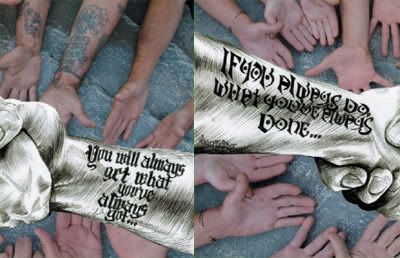
 I found this beautiful video on Revd Bosco Peters' Liturgy blog - it's the monks of the Russian Orthodox Valaam monastery singing the phrases from Matthew 5:3-12, helping us to try to identify that hardest of questions, who is the neighbour that Moses' book of Leviticus tells us we should love as ourselves, a task Rabbi Akiva called "the greatest principle of the Torah. I hope the present and future bodies looking at funding the Willow Walker will see that helping presently and formerly homeless people both fits in seamlessly with the Judaeo-Christian principles upon which our country is built, and makes sound econonomic, social, political and humanitarian sense.
I found this beautiful video on Revd Bosco Peters' Liturgy blog - it's the monks of the Russian Orthodox Valaam monastery singing the phrases from Matthew 5:3-12, helping us to try to identify that hardest of questions, who is the neighbour that Moses' book of Leviticus tells us we should love as ourselves, a task Rabbi Akiva called "the greatest principle of the Torah. I hope the present and future bodies looking at funding the Willow Walker will see that helping presently and formerly homeless people both fits in seamlessly with the Judaeo-Christian principles upon which our country is built, and makes sound econonomic, social, political and humanitarian sense.
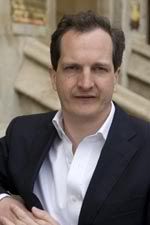 Professor Calculus and I usually don't watch TV (except for the odd snooker or cricket game) when we meet to put the world to rights over a glass of wine, but we watched QT to see the newly-elected MEP for Yorkshire and Humberside crumbling in the face of real politicians, only to see what Cranmer called "the Nick Griffin show". Griffin certainly faced some hard questions, but smirked through them - and at one point was challenged by host Jonathan Dimbleby for smiling when talking about Holocaust denial - and, in the words of James Bethell, founder of the blog There's Nothing British about the BNP, "retired wounded but on his feet, fit to fight another day".
Professor Calculus and I usually don't watch TV (except for the odd snooker or cricket game) when we meet to put the world to rights over a glass of wine, but we watched QT to see the newly-elected MEP for Yorkshire and Humberside crumbling in the face of real politicians, only to see what Cranmer called "the Nick Griffin show". Griffin certainly faced some hard questions, but smirked through them - and at one point was challenged by host Jonathan Dimbleby for smiling when talking about Holocaust denial - and, in the words of James Bethell, founder of the blog There's Nothing British about the BNP, "retired wounded but on his feet, fit to fight another day".Griffin stated the law prevented him from disclosing why he had "changed his mind" on the Holocaust, at which Jack Straw, as Justice Secretary, said he wasn't aware of any law which would punish him from doing so.Sir Winston Churchill put everything on the line so that my ancestors wouldn't get slaughtered in the concentration camps. But here sits a man who says that is a myth just like a flat world was a myth.
 For me, the best bit was Baroness Sayeeda Warsi stating that Britain needed a cap on numbers of immigrants coming into Great Britain, which echoed a Telegraph article written by Labour's Frank Field and the Conservatives' Nicholas Soames, co-founders of the Cross-Party Group on Balanced Migration which states in its title that Cowardice on immigration has allowed the BNP to Flourish and adds that the asylum system, designed to identify individuals in genuine danger of persecution or death should they return to their own countries, has "collapsed". The story defining its collapse has to be that of a Bolivian man whose appeal against deportation was upheld by Judge James Devittie because he'd bought an English cat. In a startling exclusive, the Telegraph's Tom Whitehead reports that Andrew Neather, who had been an advisor to Jack Straw, former Home Secretary David Blunkett and former Prime Minister Tony Blair claims that mass immigration - the Bête Noire of the BNP - was "partly due to a politically motivated attempt by ministers to radically change the country and rub the Right's nose in diversity". (Baroness Warsi's comments on immigration start at 2:38 in the video below.)
For me, the best bit was Baroness Sayeeda Warsi stating that Britain needed a cap on numbers of immigrants coming into Great Britain, which echoed a Telegraph article written by Labour's Frank Field and the Conservatives' Nicholas Soames, co-founders of the Cross-Party Group on Balanced Migration which states in its title that Cowardice on immigration has allowed the BNP to Flourish and adds that the asylum system, designed to identify individuals in genuine danger of persecution or death should they return to their own countries, has "collapsed". The story defining its collapse has to be that of a Bolivian man whose appeal against deportation was upheld by Judge James Devittie because he'd bought an English cat. In a startling exclusive, the Telegraph's Tom Whitehead reports that Andrew Neather, who had been an advisor to Jack Straw, former Home Secretary David Blunkett and former Prime Minister Tony Blair claims that mass immigration - the Bête Noire of the BNP - was "partly due to a politically motivated attempt by ministers to radically change the country and rub the Right's nose in diversity". (Baroness Warsi's comments on immigration start at 2:38 in the video below.)Above all, people are disposed to mistake predicting troubles for causing troubles and even for desiring troubles: "If only," they love to think, "if only people wouldn't talk about it, it probably wouldn't happen."
Perhaps this habit goes back to the primitive belief that the word and the thing, the name and the object, are identical.
 Or, indeed, if they were descended from the freedom-fighters who fought at the Battle of Cable Street in London's East End against black-shirted fascists led by Oswald Moseley, the Independent Labour Party MP who, disappointed by his party's response to unemployment, left in 1930 to form the New Party. Gordon Brown, in Maxton, his biography of the hard-left Scottish MP, records that when Moseley left James Maxton said that "he ought not to be condemned but thanked [because] his actions s
Or, indeed, if they were descended from the freedom-fighters who fought at the Battle of Cable Street in London's East End against black-shirted fascists led by Oswald Moseley, the Independent Labour Party MP who, disappointed by his party's response to unemployment, left in 1930 to form the New Party. Gordon Brown, in Maxton, his biography of the hard-left Scottish MP, records that when Moseley left James Maxton said that "he ought not to be condemned but thanked [because] his actions s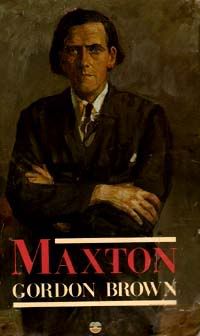 howed a deeper sense of responsibility about the unemployed and might lead to a 'new direction' in government policy". And just as the Nazis' response to Germany's economic woes was nationalisation on a massive scale, the BNP's website (which describes the three main parties as "liars, buggers and thieves") proposes nationalisation as a panacea for Britain's. One gets a sense of the political spectrum not as a line but a circle, where "hard-left" and "far-right" occupy the same space.
howed a deeper sense of responsibility about the unemployed and might lead to a 'new direction' in government policy". And just as the Nazis' response to Germany's economic woes was nationalisation on a massive scale, the BNP's website (which describes the three main parties as "liars, buggers and thieves") proposes nationalisation as a panacea for Britain's. One gets a sense of the political spectrum not as a line but a circle, where "hard-left" and "far-right" occupy the same space. As somebody who has a great respect for tenacity in the face of eejits, I just had to bring you verbatim part of this review by Tim Challies, who contributes to the blog
As somebody who has a great respect for tenacity in the face of eejits, I just had to bring you verbatim part of this review by Tim Challies, who contributes to the blog 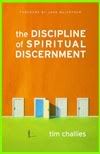 Discerning Reader as well as maintaining his own at Challies Dot Com; he's just brought out a book called The Discipline of Spiritual Discernment.
Discerning Reader as well as maintaining his own at Challies Dot Com; he's just brought out a book called The Discipline of Spiritual Discernment.It is a rare occasion that I find it difficult to point out any redeeming features in a book—when I struggle to find a single positive to write in a review. Unfortunately Karen Armstrong’s The Case for God is one of those books—one that is so monstrously bad, so hopelessly awful, so wretchedly miserable, that it took concerted effort just to finish it. Heck, even the cover stinks—a pile of religiously-significant books hovering at a strange angle over a plain background. I tell you what: I will concede the font. The book is set in Granjon, a very nice, classical font that is very consistent with the earliest Garamond type faces. It is classy and classical but without being antique. But that is as good as the book gets.I remember the former nun's sententious fingerwagging on discussion shows in the 80s and 90s, where she would be introduced as representing the Christian or even the Roman Catholic viewpoint. Her indifferentism as regards very different religions does none of them any favours, and I believe her being given the Rossevelt Institute's Freedom of Worship Medal is a slur on the great man's legacy.
 Last week I attended an event designed to raise awareness about the Willow Walker, a unique magazine produced for and by homeless people in Cambridge. It may soon have to close because its funding body, the Churches Housing Trust, has decided - bizarrely, in my opinion - that its activities and articles don't accord with the trust's Christian ethos.
Last week I attended an event designed to raise awareness about the Willow Walker, a unique magazine produced for and by homeless people in Cambridge. It may soon have to close because its funding body, the Churches Housing Trust, has decided - bizarrely, in my opinion - that its activities and articles don't accord with the trust's Christian ethos. The photo that was taken accompanied an article by the Cambridge News' Chris Havergal. Whereas we were quite optimistic after a donation of £4,000 from Cambridge University Press to ensure that the Autumn Willow Walker came out, Chris' article, entitled Blow to campaign to save voice of homeless, stated that Cambridge City Council's head of strategic housing, Alan
The photo that was taken accompanied an article by the Cambridge News' Chris Havergal. Whereas we were quite optimistic after a donation of £4,000 from Cambridge University Press to ensure that the Autumn Willow Walker came out, Chris' article, entitled Blow to campaign to save voice of homeless, stated that Cambridge City Council's head of strategic housing, Alan Carter, had announced that the Council did not wish to fund projects that duplicated services, citing Wintercomfort for the Homeless, a service where members of the street community can get some shelter and a feed. Wintercomfort - the brainchild of Henry Rothschild, WWII veteran and founder of the Primavera group of galleries, who died in May this year - is too tightly stretched to apply for additional funds for the Willow Walker.
Carter, had announced that the Council did not wish to fund projects that duplicated services, citing Wintercomfort for the Homeless, a service where members of the street community can get some shelter and a feed. Wintercomfort - the brainchild of Henry Rothschild, WWII veteran and founder of the Primavera group of galleries, who died in May this year - is too tightly stretched to apply for additional funds for the Willow Walker. rvices for them. From the Willow Walker has sprung Homeless Truths, a radio show for and by homeless people, on which a police representative was once interviewed, getting a viewpoint of which the street community can be suspicious into the heart of that community; Cambridge Link-Up is another shoot, recycling everyday items with pleasing and surprising results; and Street Voices has not only released a double CD to critical acclaim, but has shown the big-heartedness of people who are or have been homeless by p
rvices for them. From the Willow Walker has sprung Homeless Truths, a radio show for and by homeless people, on which a police representative was once interviewed, getting a viewpoint of which the street community can be suspicious into the heart of that community; Cambridge Link-Up is another shoot, recycling everyday items with pleasing and surprising results; and Street Voices has not only released a double CD to critical acclaim, but has shown the big-heartedness of people who are or have been homeless by p erforming concerts of words and music for Homelessness Sunday and Leprosy Sunday, as well as performing a major concert at Cambridge Guildhall. The magazine once ran an article by Dave Whitman, of Chicago cultural arts project Temporary Services; Dave remains a supporter.
erforming concerts of words and music for Homelessness Sunday and Leprosy Sunday, as well as performing a major concert at Cambridge Guildhall. The magazine once ran an article by Dave Whitman, of Chicago cultural arts project Temporary Services; Dave remains a supporter. Every process needs a stable pivot, and as far as the Willow Walker is concerned, that pivot is Kirsten Lavers. She is an unwavering voice of advocacy for homeless people in Cambridge, nad her skills will be needed more than ever when - given the significant concomitancy of mental distress with homelessness - we've lost the Clubhouse, two acute psychiatric wards and a rehabilitation house; and the city's Mental Health Resource Centre is soon to go. To let the Willow Walker fail would be to score a "fail" in enlightened self-interest. The Cambridge Link-Up website puts it best:
Every process needs a stable pivot, and as far as the Willow Walker is concerned, that pivot is Kirsten Lavers. She is an unwavering voice of advocacy for homeless people in Cambridge, nad her skills will be needed more than ever when - given the significant concomitancy of mental distress with homelessness - we've lost the Clubhouse, two acute psychiatric wards and a rehabilitation house; and the city's Mental Health Resource Centre is soon to go. To let the Willow Walker fail would be to score a "fail" in enlightened self-interest. The Cambridge Link-Up website puts it best: We believe that homeless people are a massively untapped resource of skills, creativity, knowledge and experience able to contribute positively to their community.
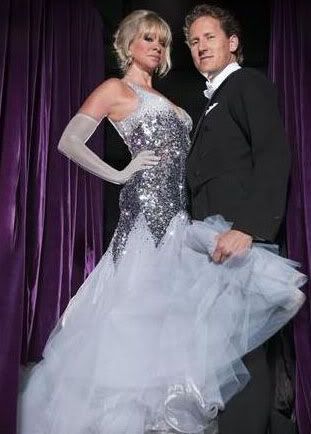
 didn't "know how to teach confidence". And it wouldn't have done her self-esteem much good to learn, shortly before dance lessons began, that her hard-living spouse had traded her in for a newer model in the form of cocktail waitress Ekaterina Ivanova.
didn't "know how to teach confidence". And it wouldn't have done her self-esteem much good to learn, shortly before dance lessons began, that her hard-living spouse had traded her in for a newer model in the form of cocktail waitress Ekaterina Ivanova.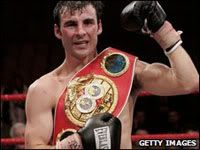 at he should be careful to wear glasses when judging Joe Calzaghe' dance with Kristina Rihannof. Calzaghe was bullied at school (more targeting?), and his process of toughening himself up undoubtedly contributed to his being the only undefeated boxing champion in Great Britain. He now helps promote the anti-bullying charity beatbullying Wales.
at he should be careful to wear glasses when judging Joe Calzaghe' dance with Kristina Rihannof. Calzaghe was bullied at school (more targeting?), and his process of toughening himself up undoubtedly contributed to his being the only undefeated boxing champion in Great Britain. He now helps promote the anti-bullying charity beatbullying Wales.
 d's Dancing with the Stars - told the camera that "it's Craig's ignorance and lack of knowledge of the dance that leads him to say things like this".
d's Dancing with the Stars - told the camera that "it's Craig's ignorance and lack of knowledge of the dance that leads him to say things like this".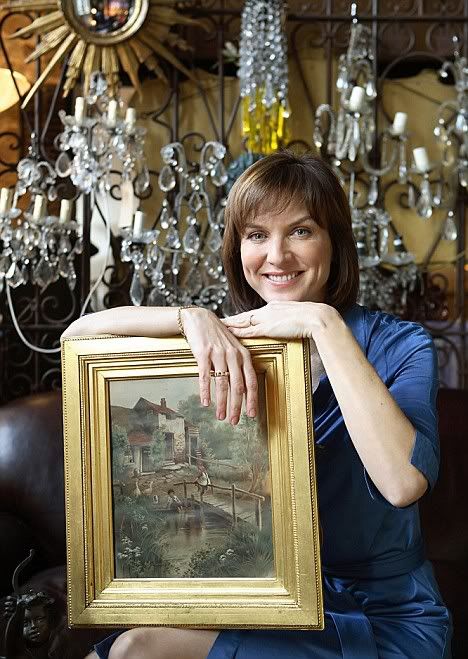 now fronts Antiques Roadshow, has faced accusations which boil down to being female in public - ie that she has sexed-up and dumbed-down the show; and, of course, there are the criminally obscene phone messages left on actor Andrew Sachs' answerphone about his granddaughter Georgina Bailie's relationship with Jonathan Ross, with the Corporation initially in denial that anything out of place had happened in the face of mounting complaints.
now fronts Antiques Roadshow, has faced accusations which boil down to being female in public - ie that she has sexed-up and dumbed-down the show; and, of course, there are the criminally obscene phone messages left on actor Andrew Sachs' answerphone about his granddaughter Georgina Bailie's relationship with Jonathan Ross, with the Corporation initially in denial that anything out of place had happened in the face of mounting complaints. who described his role in a teenage relationship with a showbusiness "sugar-daddy" as one that he "likened...to being a rent boy", other than to ask that if I were to call him a wicked old queen (he's playing the part of the queen in Snow White in Llandudno this Christmas), would it then be me who was cast as being the bully, because I had arguably cast aspersions on an abrasive member of a minority that the BBC perceives as being in need of protection?
who described his role in a teenage relationship with a showbusiness "sugar-daddy" as one that he "likened...to being a rent boy", other than to ask that if I were to call him a wicked old queen (he's playing the part of the queen in Snow White in Llandudno this Christmas), would it then be me who was cast as being the bully, because I had arguably cast aspersions on an abrasive member of a minority that the BBC perceives as being in need of protection?
 Through the week, I was coming back to find my cycle after giving a short talk in Cambridge when I was stopped by a young woman called Maria. She was carrying a fold-over clipboard that proclaimed "Friends of the Earth" on the front; she had a Mediterranean accent, and eyes to match.
Through the week, I was coming back to find my cycle after giving a short talk in Cambridge when I was stopped by a young woman called Maria. She was carrying a fold-over clipboard that proclaimed "Friends of the Earth" on the front; she had a Mediterranean accent, and eyes to match. Maria said she was there to raise awareness about the United Nations Climate Change Conference that was going to take place in Copenhagen in December. I thanked her and said I was already aware of it, and mentioned the lack of awareness about, at one end of the scale, the fire at the Littleport tyre recycling facility, near Ely in Cambridgeshire, that was spewing greenhouse gasses into the atmosphere like nothing on earth; and, on the other, the assertion that US president Barack Obama was so concerned about climate change that he was, in the words of Conservative peer Lord Christopher Monckton (right), willing to cede US sovereignty to a worldwide authority that resembled nothing so much as a government.
Maria said she was there to raise awareness about the United Nations Climate Change Conference that was going to take place in Copenhagen in December. I thanked her and said I was already aware of it, and mentioned the lack of awareness about, at one end of the scale, the fire at the Littleport tyre recycling facility, near Ely in Cambridgeshire, that was spewing greenhouse gasses into the atmosphere like nothing on earth; and, on the other, the assertion that US president Barack Obama was so concerned about climate change that he was, in the words of Conservative peer Lord Christopher Monckton (right), willing to cede US sovereignty to a worldwide authority that resembled nothing so much as a government.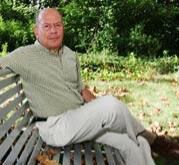 Where I disagreed with her - and maybe I was being a bit previous as she hadn't mentioned population - was that an American economist, Jesse Ausubel, recently published an article in New Scientist saying that modern farming techniques could support a world population of 10 billion. I didn't actually go on to the United Nations Food and Agriculture Organisation (FAO) estimate in 1995 quoted by John Smeaton, Director of the Society for the Protection of Unborn Children, that agrictulture could support 30 billion people.
Where I disagreed with her - and maybe I was being a bit previous as she hadn't mentioned population - was that an American economist, Jesse Ausubel, recently published an article in New Scientist saying that modern farming techniques could support a world population of 10 billion. I didn't actually go on to the United Nations Food and Agriculture Organisation (FAO) estimate in 1995 quoted by John Smeaton, Director of the Society for the Protection of Unborn Children, that agrictulture could support 30 billion people. We went onto "Gaia", I have to admit, because I led the conversation there. Maria had never heard of it. So I took a deep breath and explained that according to the Gaian theory the earth was an organism with its own compensatory mechanisms. The reason I went there was because Maria had mentioned deforestation in the Amazon. I agreed this was a bad thing, and dropped in the suggestion of James Lovelock - originator of the Gaia hypothesis - that we bury nuclear waste in Amazonia in order to discourage people from settling there.
We went onto "Gaia", I have to admit, because I led the conversation there. Maria had never heard of it. So I took a deep breath and explained that according to the Gaian theory the earth was an organism with its own compensatory mechanisms. The reason I went there was because Maria had mentioned deforestation in the Amazon. I agreed this was a bad thing, and dropped in the suggestion of James Lovelock - originator of the Gaia hypothesis - that we bury nuclear waste in Amazonia in order to discourage people from settling there. The Giant Pacific Octopus (Enteroctopus dofleini) is not an animal that I'd given any thought to before, but after it's all-too-brief appearance on the Open University documentary Life, which aired on BBC1 tonight, I've thought of little else. (The pic, to the right, is from the Royal BC Museum in Canada, photographed by Jim Cosgrove.)
The Giant Pacific Octopus (Enteroctopus dofleini) is not an animal that I'd given any thought to before, but after it's all-too-brief appearance on the Open University documentary Life, which aired on BBC1 tonight, I've thought of little else. (The pic, to the right, is from the Royal BC Museum in Canada, photographed by Jim Cosgrove.) Other animals featured in this first instalment - called Challenges of Life. There were three cheetah bringing down an ostrich, and a grasshopper that presumably thought things were bad enough when it was caught on a spider's web before a toad's tongue sucked it off. And, in a mammoth 3-month operation involving HMS Endurance, Antarctic sailor Jérôme Poncet in the Golden Fleece and veteran wildlife film-maker Doug Allan off Rosenthal Island, a leopard seal, with teeth bigger th
Other animals featured in this first instalment - called Challenges of Life. There were three cheetah bringing down an ostrich, and a grasshopper that presumably thought things were bad enough when it was caught on a spider's web before a toad's tongue sucked it off. And, in a mammoth 3-month operation involving HMS Endurance, Antarctic sailor Jérôme Poncet in the Golden Fleece and veteran wildlife film-maker Doug Allan off Rosenthal Island, a leopard seal, with teeth bigger th an a lion's and jaws that can open 180°, flaying a penguin chick mouthful by mouthful (which left Allan exhilarated at catching some action at last but sad to see the chick's fate).
an a lion's and jaws that can open 180°, flaying a penguin chick mouthful by mouthful (which left Allan exhilarated at catching some action at last but sad to see the chick's fate). On the other hand, there are things that look like altruism which are anything but - take Hilary Clinton's visit to the Stormont estate in Belfast yesterday. Giving Unionist members of the Northern Ireland assembly a barracking about ending the impasse over further devolution of the police force won't do her standing any harm in the eyes of those of her Democrat supporters who would always put a coin in the NORAID can, while Sinn Féin, whose voters have to live with the realities caused by volatile horse-trading, called for loyalists to be given time to think.
On the other hand, there are things that look like altruism which are anything but - take Hilary Clinton's visit to the Stormont estate in Belfast yesterday. Giving Unionist members of the Northern Ireland assembly a barracking about ending the impasse over further devolution of the police force won't do her standing any harm in the eyes of those of her Democrat supporters who would always put a coin in the NORAID can, while Sinn Féin, whose voters have to live with the realities caused by volatile horse-trading, called for loyalists to be given time to think.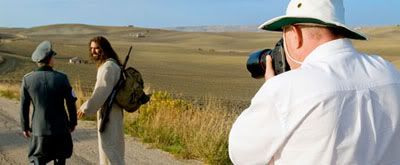
 Many years ago, I was introduced to a poor woman who believed she'd been cursed. Working in Kenya, she'd been targeted by a nasty piece of work who'd stolen an item of her underwear at that time of the month and performed a ritual that had involved desecrating a grave, then demanded money from her. I tried to persuade her that by buying into what this chap was saying she'd effectively cursed herself. In medicine it's known as the sinister side of the placebo effect, which has been christened the "nocebo effect" (from the Latin for "I will harm") - essentially, belief that you're doomed dooms you, the principle that fuels voodoo.
Many years ago, I was introduced to a poor woman who believed she'd been cursed. Working in Kenya, she'd been targeted by a nasty piece of work who'd stolen an item of her underwear at that time of the month and performed a ritual that had involved desecrating a grave, then demanded money from her. I tried to persuade her that by buying into what this chap was saying she'd effectively cursed herself. In medicine it's known as the sinister side of the placebo effect, which has been christened the "nocebo effect" (from the Latin for "I will harm") - essentially, belief that you're doomed dooms you, the principle that fuels voodoo. Umbrage seemed to be taken at the suggestion of Fr David Paul of Our Lady and the English Martyrs, the targeted church (known as OLEM), that "People who go to these things often end up with mental problems". While not wishing to offend people who follow other faiths gratuitously, I would support his statement. Some pagans report experiences of transmitting and receiving thoughts, possession-states, seeing and communicating with spiritual beings and other phenomena that, regardless of whether they exist, are perceived by many people during episodes of mental illness. (Thought-broadcasting, thought insertion, dissociation states and visual and auditory hallucinations, respectively.)
Umbrage seemed to be taken at the suggestion of Fr David Paul of Our Lady and the English Martyrs, the targeted church (known as OLEM), that "People who go to these things often end up with mental problems". While not wishing to offend people who follow other faiths gratuitously, I would support his statement. Some pagans report experiences of transmitting and receiving thoughts, possession-states, seeing and communicating with spiritual beings and other phenomena that, regardless of whether they exist, are perceived by many people during episodes of mental illness. (Thought-broadcasting, thought insertion, dissociation states and visual and auditory hallucinations, respectively.)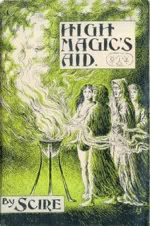 red the book What Witches Do, which seemed basically to be a vehicle for Sanders' disciple, Stewart Farrar, to publish pictures of Sanders' wife Maxine naked.
red the book What Witches Do, which seemed basically to be a vehicle for Sanders' disciple, Stewart Farrar, to publish pictures of Sanders' wife Maxine naked. ity to women in an environment where sex was likely. Sanders added a Freudian twist when he claimed to have been initiated into higher levels of "the Craft" by his grandmother with rituals involving incestuous sex. The cover of Gardner's novel, High Magic's Aid, shows a naked woman in the company of a dressed man, a recurrent theme of pornography; I would definitely add the risk of sexual exploitation of vulnerable people to Fr Paul's concerns.
ity to women in an environment where sex was likely. Sanders added a Freudian twist when he claimed to have been initiated into higher levels of "the Craft" by his grandmother with rituals involving incestuous sex. The cover of Gardner's novel, High Magic's Aid, shows a naked woman in the company of a dressed man, a recurrent theme of pornography; I would definitely add the risk of sexual exploitation of vulnerable people to Fr Paul's concerns. So how did Shadee summon up his "elemental", if indeed he did any such thing? I don't know, but he states that he tends to work alone so, given the fixation of some sectors of paganism with matters sexual, the mind boggles. But any parishioner in OLEM or any other church who felt threatened might feel reassured after sitting and having a pray, or reading from Scripture - I like John 1:1-18; a word in the ear of the Blessed Virgin never goes amiss, and I'm sure clergypeople would be happy to speak to anybody who was worried. Matthew 18:20 tells us that we have a way to make Jesus present that is much more powerful than dodgy doings by a manipulative self-publicist.
So how did Shadee summon up his "elemental", if indeed he did any such thing? I don't know, but he states that he tends to work alone so, given the fixation of some sectors of paganism with matters sexual, the mind boggles. But any parishioner in OLEM or any other church who felt threatened might feel reassured after sitting and having a pray, or reading from Scripture - I like John 1:1-18; a word in the ear of the Blessed Virgin never goes amiss, and I'm sure clergypeople would be happy to speak to anybody who was worried. Matthew 18:20 tells us that we have a way to make Jesus present that is much more powerful than dodgy doings by a manipulative self-publicist.

Draughty Old Fen, Cambridgeshire |


